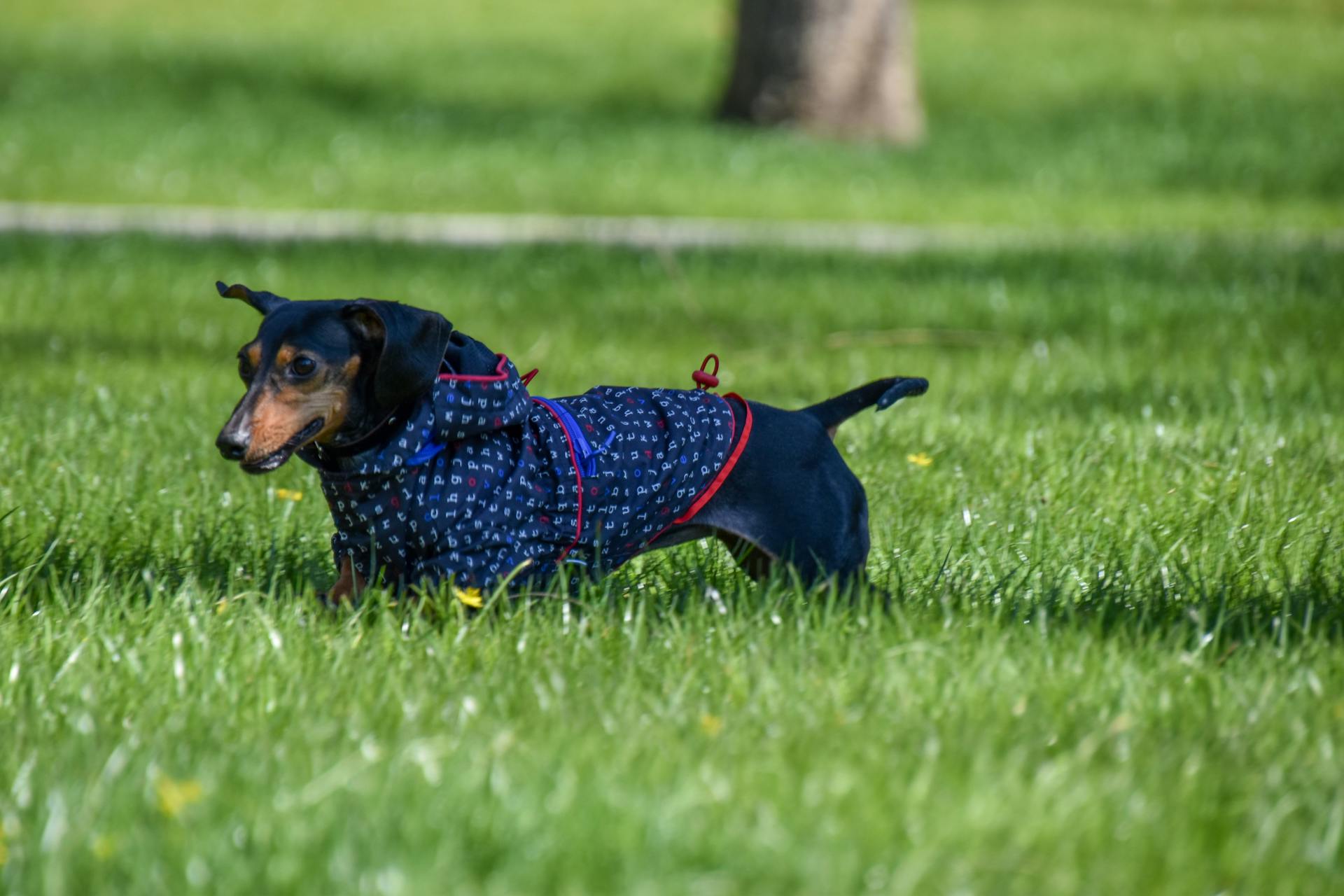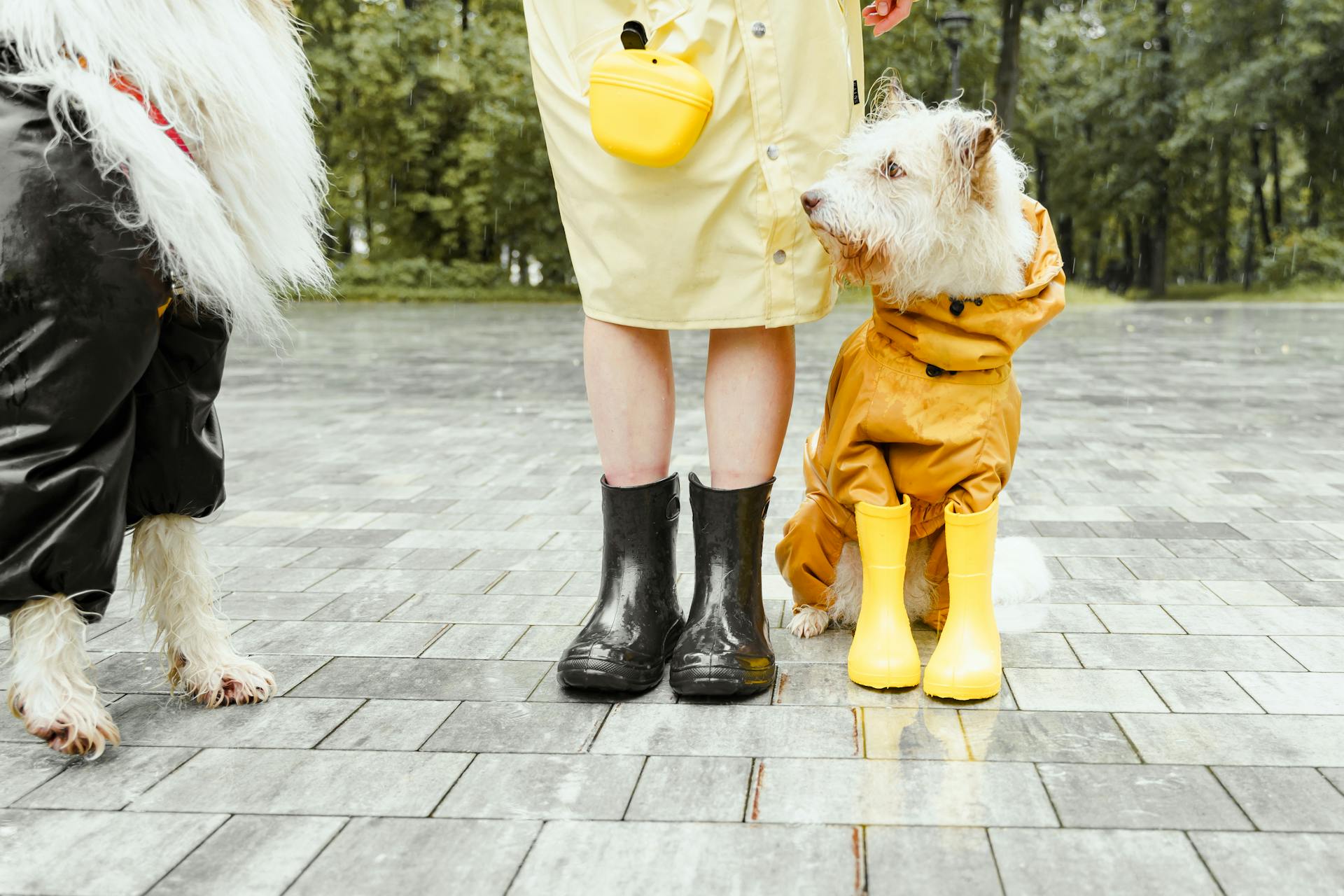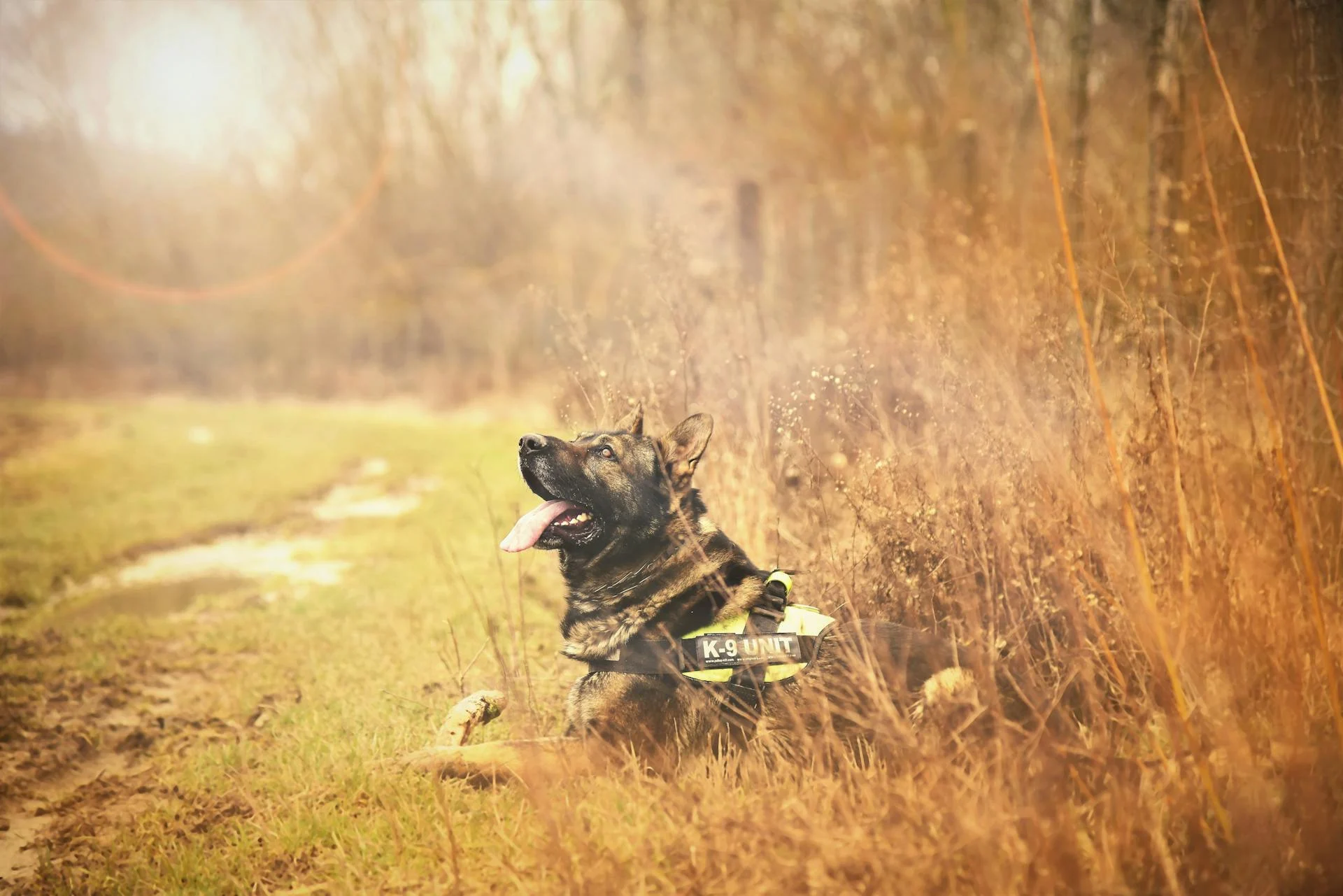
German Shepherds are known for their loyalty and affection towards their families, which can sometimes be misinterpreted as clinginess. They have a strong instinct to protect and care for their pack, and this can lead to separation anxiety.
Their high energy levels and need for mental and physical stimulation can also contribute to clinginess. German Shepherds are bred to work and need to stay engaged, or they can become destructive and restless.
Their history as a herding breed has taught them to be responsive to their handler's commands and to follow closely. This trait has been passed down through generations, making them highly attuned to their family's needs.
In fact, German Shepherds are often described as "velcro dogs" because of their tendency to stick close by. With proper training and exercise, however, they can learn to balance their need for attention with independence.
It's in Their Genes
German Shepherds are bred to herd sheep and work alongside one person, which is why they look to their owners for direction and read their body language and commands. This results in a strong attachment and extreme loyalty to one person.
You might like: My Dog Bit the Amazon Delivery Person
Their history as working dogs is deeply ingrained in their genes, making them highly loyal to one person they depend on. They were initially bred to herd sheep and other livestock and to work alongside one person.
German Shepherds are extremely intelligent and easy to train, which makes them a great fit as family pets and working dogs. Their intelligence and trainability are a result of their breeding as working dogs.
In fact, German Shepherds are so clingy because it's a characteristic of their breed - they are not independent by nature. They want to be around their owners all the time, just like they would be around their shepherd or farmer.
Their strong attachment to one person is a result of their breeding and genetics, which is why they make ideal first dogs for people who have the time to devote to them.
For another approach, see: Working Line German Shepherds
Understanding Anxiety
German Shepherds are notorious for their clingy nature, and it's not just because they're attached to their owners. Separation anxiety is a common issue in this breed, causing them to panic when left alone. This can result in destructive behavior, such as chewing on furniture or excessive barking.
A clingy German Shepherd is not the same as a dog with separation anxiety. While both behaviors involve a strong attachment to their owner, a clingy dog is happy to follow them around the house but doesn't mind being left alone. In contrast, a dog with separation anxiety will become anxious and stressed when left alone, often displaying behaviors like pacing, whining, or barking.
Some common symptoms of separation anxiety in German Shepherds include:
- Pacing around
- Whining excessively
- Barking or howling excessively
- Escape from their crate or room
- Peeing or pooping when you're gone
- Chewing inappropriate items such as furniture
- Showing signs of anxiety when they know you're about to leave
It's worth noting that separation anxiety can be triggered by various factors, including a significant change in the dog's routine, past abandonment or mistreatment, or even just a strong attachment to their owner. German Shepherds, in particular, are prone to separation anxiety due to their pack animal nature and high dependency on their owners.
Attention-Seeking Behavior
Attention-seeking behavior is a common trait in German Shepherds, and it's not just because they're trying to be annoying. In fact, research has shown that German Shepherds thrive on human attention and affection, and they'll do whatever it takes to get it.
Following their owner everywhere is a way for them to get the attention and interaction they crave, as seen in Example 2. This behavior is often referred to as "human-directed gazing", which is associated with dependency and neediness.
A study of three dog breeds found that German Shepherds became needier during a feeding experiment, displaying high levels of human-gazing. This is connected to their desire for comfort, encouragement, and support from their owners.
German Shepherds are naturally inclined to follow their owners around, but reinforcing this behavior by constantly petting, kissing, and praising them can make them even more clingy, as noted in Example 4.
In fact, German Shepherds are so attuned to their owners that they can become demanding and act out if they're not getting enough attention, leading to dramatic behavior to get their owner's attention, as seen in Example 6.
Here are some common signs of attention-seeking behavior in German Shepherds:
- Scent: They use their sense of smell to track their owners and stay close.
- Body language: They use body language to communicate their needs and desires.
- Facial expression: They use their facial expressions to show affection and seek attention.
By recognizing these signs and understanding the reasons behind their attention-seeking behavior, you can take steps to address it and help your German Shepherd feel more secure and independent.
Lack of Socialization and Training
Lack of socialization can lead to clingy behavior in German Shepherds. If a German Shepherd is not well-socialized from a young age, it can become anxious and act out by displaying dramatic behavior such as barking or howling.
German Shepherds must be properly socialized to prevent potential behavior problems. This can include introducing them to new people, places, and experiences to help them become confident and calm in new situations.
Training is also essential for German Shepherds. They are highly trainable dogs and can learn to follow their owner everywhere, which can be a result of obedience training.
You might enjoy: Becoming a Dog Trainer for Service Dogs
Lack of Socialization
Lack of socialization can lead to anxious behavior in German Shepherds. This breed needs to be properly socialized from a young age to prevent potential behavior problems.
German Shepherds are pack animals and feel more comfortable around other beings they trust. This means they need to be exposed to various people, environments, and situations to become confident and calm.
If a German Shepherd is not well-socialized, it can become anxious and act out by displaying dramatic behavior such as barking or howling. This is because they lack the necessary social skills to cope with new situations.
Proper socialization can help prevent separation anxiety in German Shepherds. This is because they learn to be comfortable with their owner's absence and understand that they will return.
Here are some signs of inadequate socialization in German Shepherds:
- Barking or howling excessively
- Displaying dramatic behavior
- Being overly clingy or attached to their owner
- Being fearful or aggressive towards new people or environments
To socialize your German Shepherd, start by exposing them to various people, environments, and situations. This can include taking them on walks, visiting dog parks, and introducing them to new friends and family members.
Switch Your Routine
Switching up your daily routine can be a game-changer in helping to break your German Shepherd's clinginess habit. By mixing up the order of your routine, you can throw your dog for a loop and reduce their anxiety when you grab your keys.
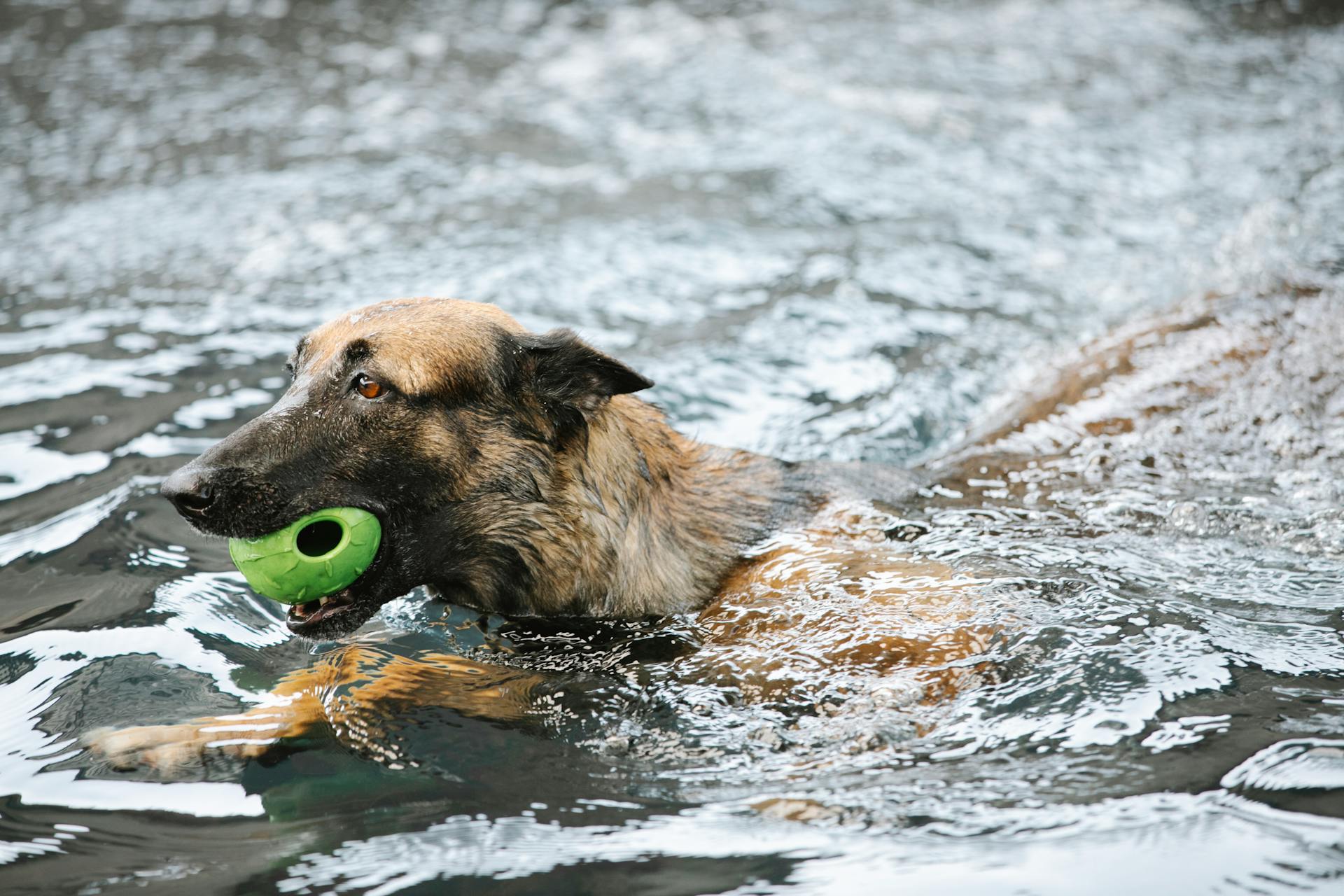
To do this, try changing the order of your daily tasks, such as taking your German Shepherd for a walk, feeding them, and then making your coffee. This will keep them guessing and make them less likely to associate certain actions with your departure.
Don't always connect one action with leaving the house. For example, if your German Shepherd comes running over to you when you grab your keys, try getting them accustomed to you holding your keys without leaving the house. This is called desensitizing your dog to your movements.
Here are some specific ways to desensitize your German Shepherd:
- Mix up the order of your daily tasks.
- Get your dog used to you holding your keys without leaving the house.
- Reduce the amount of petting and fussing before leaving and returning home.
Environmental Factors
German Shepherds are highly attuned to their environment, and unfamiliarity with it can cause them to exhibit dramatic behavior as a way of communicating their unease.
To help them feel more at ease, it's essential to provide a space where they can feel comfortable exploring and learning new things while having the security of familiar items nearby.
German Shepherds are naturally wary of new environments, so it's crucial to introduce them to new spaces gradually and under controlled circumstances.
By doing so, you can help them become more confident and calm in unfamiliar surroundings, reducing the likelihood of clingy behavior.
Ensure the environment is free from hazards such as sharp objects or slippery surfaces to prevent accidents and create a safe space for them to explore.
Boredom or Inactivity
Boredom or inactivity can be a major contributor to a German Shepherd's clinginess. If they're not getting enough physical and mental stimulation, they can become bored and act out by displaying dramatic behavior such as barking or howling.
Giving your German Shepherd at least 2 hours of exercise daily is essential to tire them out physically. This can include walking, hiking, running, or swimming.
Lack of mental stimulation can damage a German Shepherd's brain, so it's crucial to provide them with interactive toys and puzzles to keep their brain sharp. You can also give them tasks around the house to keep them busy.
Consider reading: Mental Stimulation for German Shepherds
A restless and bored dog may end up being clingy, following you around the house because they have nothing else to do. This is why it's so important to provide your German Shepherd with plenty of physical and mental stimulation.
Teaching your German Shepherd simple tasks and obedience training can help keep them busy and prevent boredom. You can also try playing tug or hide-and-seek with them, or even create an obstacle course for them to navigate.
What to Do
If you're dealing with a clingy German Shepherd, it's essential to understand that they thrive on attention and interaction. German Shepherds are naturally pack animals and have a strong instinct to be close to their family members.
To address this, try setting boundaries and establishing a daily routine that includes regular exercise and playtime. This can help your German Shepherd feel more secure and less clingy.
Start by gradually increasing the amount of time your dog spends alone, beginning with short periods of 15-30 minutes.
What to Do About
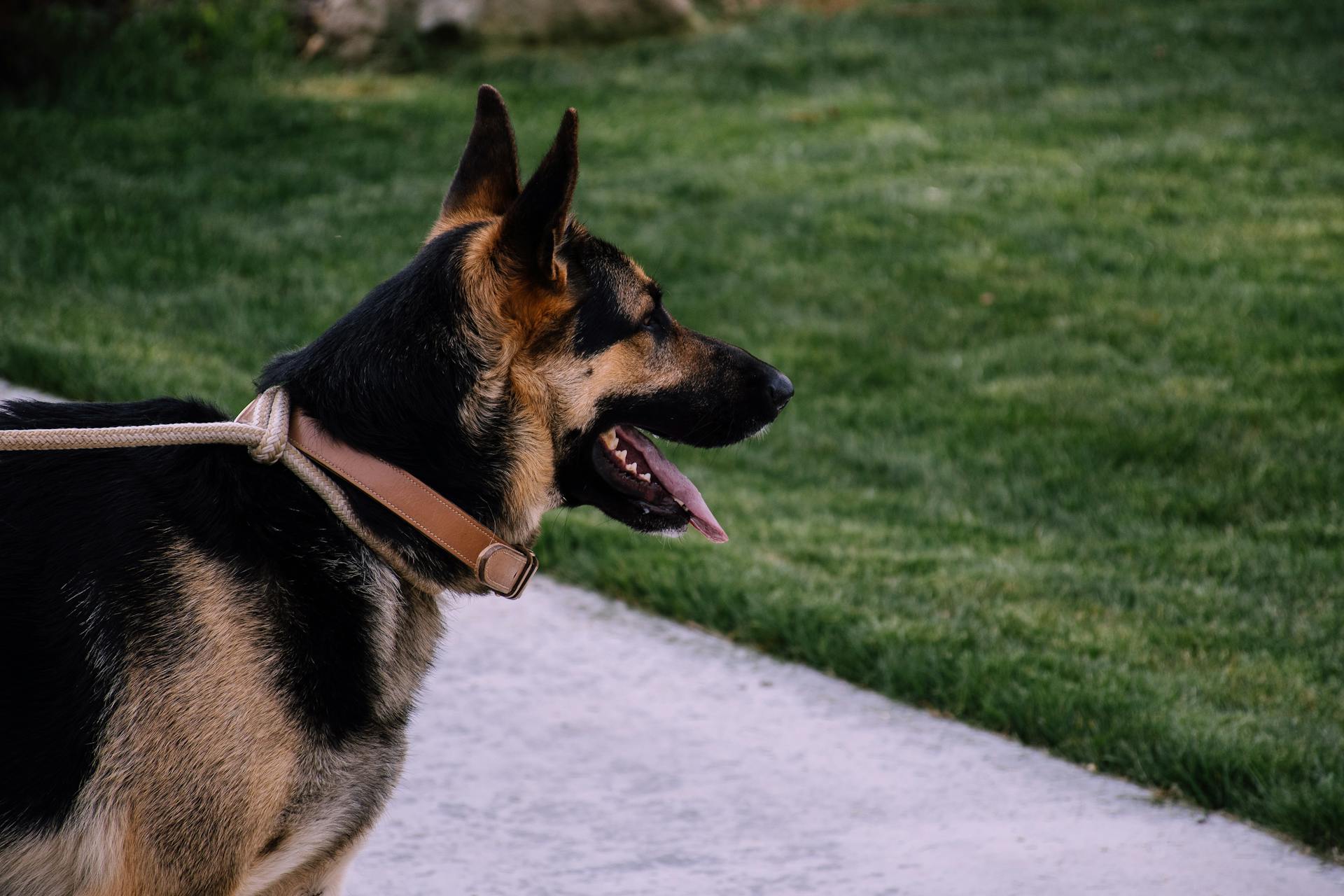
If you're struggling to make decisions, try breaking down complex problems into smaller, manageable tasks. This will help you feel more in control and focused.
One effective way to do this is by using the Eisenhower Matrix, which categorizes tasks into urgent vs. important. By prioritizing tasks based on their level of urgency and importance, you can make steady progress and avoid feeling overwhelmed.
When faced with a difficult decision, take time to gather all relevant information and weigh the pros and cons. This will help you make a more informed decision that aligns with your goals and values.
A simple yet effective decision-making framework is the "3-2-1" rule, which involves considering three potential outcomes, two potential risks, and one potential benefit of each option. This will help you think more critically and avoid making impulsive decisions.
By taking a step back and re-evaluating your goals and priorities, you can make adjustments to stay on track and avoid feeling stuck. This might involve making small changes to your daily routine or seeking out new opportunities for growth.
For more insights, see: Does Fixing a Dog Help with Aggression
When to Talk to Your Vet

It's always better to err on the side of caution and ask your vet about any concerns you have about your dog's behavior. If you're unsure whether a problem is worth bringing up, just ask.
Your vet has likely heard it all before and won't judge you for asking questions. They can help you determine if a physical or health issue is causing your pet's clinginess.
If your vet suggests a possible health issue, they can also provide remedies to help your dog feel better. Don't hesitate to ask for their advice.
If the issue persists, consider speaking with a behaviorist who can provide helpful tips on dog training and desensitizing your dog to alone time.
Take a look at this: Caesar Millan Better Human Better Dog
Summing Things Up
Recognizing the root cause of your dog's velcro behavior is key to addressing the issue. If it's a new behavior, you can start by taking steps to fix it.
Enacting the tips suggested throughout this article can help your dog feel more comfortable. By trying one or several of these options, you can make a positive impact.
If your dog is still exhibiting the same behaviors after trying these options, it might be time for a chat with your vet.
Frequently Asked Questions
How do you tell if your German Shepherd is attached to you?
If your German Shepherd follows you everywhere, even around the house, it's a sign they're emotionally attached to you. This attachment can be a strong indicator of a deep bond between you and your dog.
Do German Shepherds like to cuddle?
Yes, German Shepherds are known to be affectionate and love to cuddle, often acting like giant lap dogs. They enjoy close physical contact and will often follow you around to be near their favorite people.
Sources
- https://dogsandclogs.com/why-is-my-german-shepherd-so-clingy-needy/
- https://gsdcolony.com/blogs/news/why-are-german-shepherds-so-dramatic
- https://medium.com/@fitonear/why-do-german-shepherds-follow-you-everywhere-dear-german-shepherd-c6f6e426515f
- https://worldofdogz.com/why-is-my-german-shepherd-so-clingy-a-look-at-5-reasons/
- https://www.diggs.pet/blog/pet-parenting/why-is-my-dog-so-clingy-and-what-can-i-do-about-it/
Featured Images: pexels.com

